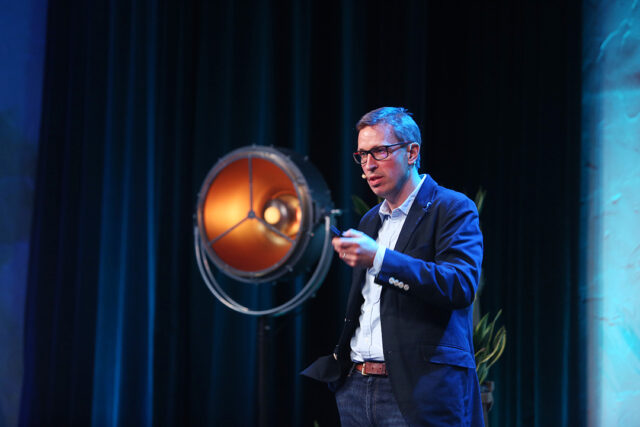Getting the balance right with anything in life can be challenging.
But when it comes to profit and doing the right thing for the environment, the stakes are pretty high.
In today’s world of 2024, Chief Procurement Officers have somewhat of a juggling act on their hands. The likes of ESG sit alongside digital transformation, talent management and supply chain risk as key items on the agenda amid a disruptive geo-political world. Procurement is also managing net zero targets, optimised cost and greater resilience with all components being considered as critical priorities to the function.
Marc Munier is the founder of DitchCarbon. He explains that industry leaders are the ones driving environmental sustainability forward. “If someone is publishing their data, it’s quite a good indicator because if you’re optimising for carbon, you’re also optimising for a well-run business that isn’t going to let you down,” he explains. “The cheaper option probably isn’t doing those things and perhaps they’re cutting corners elsewhere in their organisation so it’s a good way of highlighting that you’re dealing with a quality supplier.”
DitchCarbon’s place
The company Munier leads, DitchCarbon, solves the Scope 3 data challenge for enterprises. DitchCarbon uses AI to organise, find and normalise the carbon and climate action data delivering it into software tools that enterprises already use.
Munier reveals that one way to balance requirements as a purchasing function is by setting an internal cost of carbon. This is about implementing an amount of money that a consumer is willing to pay to obtain a slightly lower carbon option. “For example, you might say £100 a ton of carbon, if something is 10% less carbon then you’re going to save £10. You then add that on to the price between those two products that you are comparing.”
Leading global firms in a diverse range of sectors from financial services, consulting to pharma all leverage DitchCarbon’s carbon intelligence to support their Scope 3 emissions measurement, reporting and reduction goals within their preferred carbon accounting, procurement and ERP tools.
Munier explains that his organisation exists to help procurement people get the data they need to take action on their scope. “About 60% of the world’s greenhouse gases come directly from what companies buy which means procurement people are unexpectedly at the forefront of climate action – what an opportunity for them to demonstrate the value of the work they do,” discusses Munier. “If we can help them to be more sustainable in their purchasing, then they can have a really positive impact.”

Procurement’s transformation
The procurement function is changing quickly. While Munier nods to the long-standing joke between many professionals that falling into the space by mistake is a common entry point, procurement is becoming increasingly strategic to business operations. “People used to just think procurement was only about saving costs,” he explains. “But with the action of things like climate change, biodiversity and water use, these are now really important to company stakeholders. It means that procurement has now got a fantastic opportunity to do important things and jobs are incredibly complex compared to how they used to be. You’ve got to consider all these different factors, which is why I think we’ve seen this explosion in procurement tech to help support people on that journey.”
Today, a CPO within a medium to large size organisation can have a considerable impact on both the top and bottom line. Munier reflects on the procurement’s past and explains the function’s transformation has been a significant one. “Now the role of a procurement professional is to consider lots of different factors and be the driving force within your organisation for lots of positive change,” says Munier. “That brings complexity and challenge. I think the ones that are doing it well can stand tall and you can see the leaders in the space doing a great job in those areas.”
Managing the generative AI hype
Over the past 18 months, the buzz and chatter surrounding generative AI has been evident. The offer of efficiency and cost savings are always going to be an attractive proposition to procurement and it certainly caught the function’s interest. While gen AI’s full potential has yet to be realised, Munier explains that progress is already underway to harness the technology effectively.
“We’ve actually got the top-ranked custom GPT in the OpenAI store for reducing emissions called Maria,” he explains. “You can ask her any questions that you like about how to reduce your emissions, and she’ll give you some fantastic answers. She’s trained on Science Based Targets initiative (SBTi), greenhouse gas protocol, and lots of internal case studies. I believe chatbots have their place, but I don’t necessarily think that’s the bit that will help procurement people. We use AI a lot for data normalisation and data extraction which has helped power our business. One of the biggest challenges that we still see is not having a good supplier list where there’s lots of mess. By using a very simple prompt, you can clean up names and categorise things. It’s those sorts of tools via AI that are helping procurement people today and will continue to help in the future.”
Targeting a bright future
And Munier affirms he has a lot to thank the latest cutting-edge innovations for as without which DitchCarbon simply wouldn’t exist. “What we do is we automatically examine all your suppliers to find which ones have disclosed and which ones have signed up to the various initiatives. If they have disclosed, we go into the documents that they’ve disclosed and extract their carbon emission data,” explains Munier. “We then decide whether it’s verifiable based on who’s assured the data. We do nearly all of that fully automatically using our own proprietary trained models. That just wouldn’t be possible without new technology. This gives procurement people all the information they need to be sustainable.”
Having built its tech stack up over the past 18 months and integrated into the likes of SAP, Munier is excited and driven about what the future of DitchCarbon could look like. “By integrating with these platforms, we can work directly with procurement people where they need us to be,” he explains. “There’s no point having a separate sustainability platform where you go, ‘Oh, I need to think about carbon today.’ You need to be thinking about carbon in every decision that you make.”
Later this summer, DitchCarbon plans to launch a new forecasting model which examines a user’s entire supply chain via AI. “It will take into account all of their disclosures, initiatives and industries, as well as the locations that they’re in,” says Munier “We then combine all of that data into a model that can predict the rate of decarbonisation of your entire supply chain. That gives the sorts of data that large organisations need as they can’t just change overnight. We’re really excited about this.”











